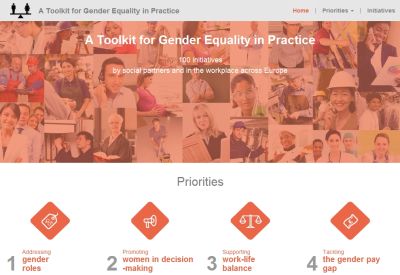100 BEST PRACTICES FOR GENDER EQUALITY AT WORK
A ‘toolkit’ of initiatives to promote gender equality is launched today in Madrid in a joint initiative by European employers and trade union organisations.
About 100 initiatives from 25 European countries are contained in the online toolkit accessible via: WWW.ERC-ONLINE.EU/GENDERTOOLKIT
It will be finalised by the EU social partners in the coming weeks.
The initiatives include:
- A work environment based on social dialogue that offers work-life balance as a pre- requisite for successfully attracting and retaining talented employees at BOLIDEN Sweden
- An additional day of paid leave for the first day of school in first grade of primary school or kindergarten is given to employees in MERCATOR Slovenia.
- A calculator ‘Logib-D’ for voluntary measuring of the pay gap in the workplace between women and men.
- “Spouse of a craftsman, is a true profession!” an initiative by CAPEB in France on the promotion of women in decision-making which acknowledges the role of co-working spouses, demanding the recognition of their professional activity and legal protection, as well as enhancing their role in the enterprise.
- A collective agreement concluded by Saint-Gobain Italy for the promotion of “Positive Actions” in favour of gender equality at work, such as targeted training for women, facilitation of access to employment and career progression.
-
The CSC campaign against gender stereotypes: “J’efface les clichés, je bosse pour l’égalité” – “I erase stereotypes, I work for equality’.
- Actions to encourage girls to choose STEM - science, technology, engineering and mathematics - skills in education: MintRelation and Girls’Day, in Germany.
The European social partners – ETUC, BUSINESSEUROPE, UEAPME and CEEP – signed a ‘Framework of Actions on Gender Equality in 2005 to promote gender equality on the labour market and in the workplace. The toolkit being launched today outlines some of the successful initiatives of the organisations’ members to achieve this.
The toolkit shows the added value of the social dialogue between employers and trade unions, and highlights their commitment and key role in enhancing gender equality throughout the EU. Through such social dialogue reaching equality between women and men can be speeded up.

